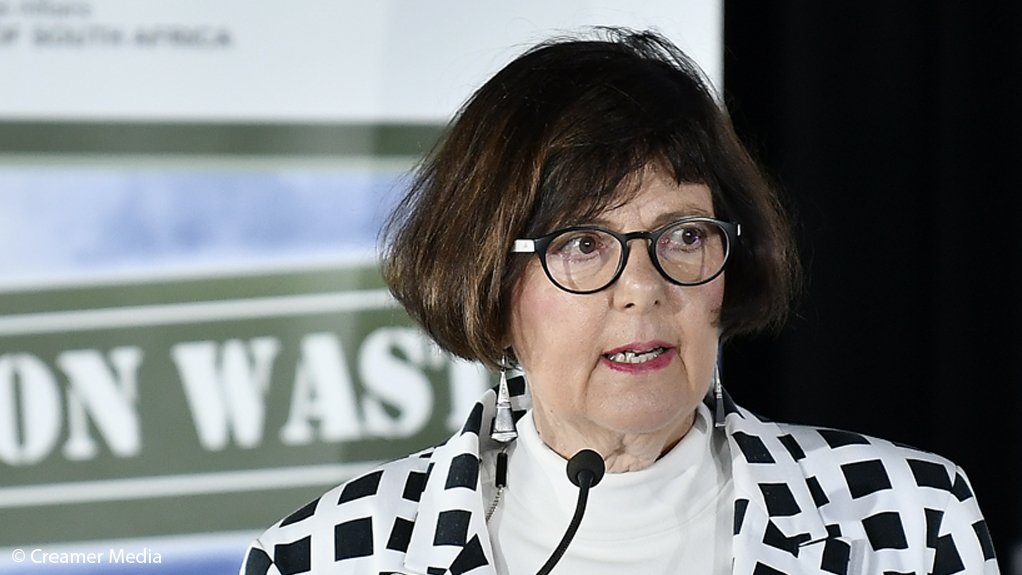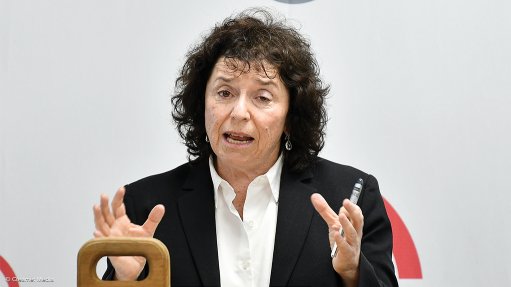South Africa needs comprehensive plan to tackle plastic waste – Creecy


Environment, Forestry and Fisheries Minister Barbara Creecy
Photo by Creamer Media's Dylan Slater
A comprehensive plan is needed to tackle the plastic waste problem countrywide and to reach the ideal of a plastic-waste-free South Africa by 2030, Environment, Forestry and Fisheries Minister Barbara Creecy said on Friday.
Speaking during a keynote address at the Plastics Colloquium, in Gauteng, she said the plan “must begin with households and consumers who are conscious of why plastic litter damages the environment, and want to do their bit to help”.
To assist in the war on waste, the Minister suggested that schools and school children “be harnessed” so that young citizens can become aware of their environmental responsibilities while raising much-needed funding for their schools.
The country’s anti-plastic-waste campaign must also be supported by an ever-improving system of municipal refuse collection, which promotes separation at source, as well as the prioritisation of rural municipalities situated along major river systems so that resources can be combined to protect the fresh water ecosystems, and stop plastic from entering the ocean.
Municipalities and other public facilities, she added, should also assist in creating spaces for buy-back and transfer centres, as well as processing facilities.
Creecy said public–private partnerships should be set up to ensure these centres were equipped with basic equipment, including conveyor belts, washing facilities, forklifts and the like.
Further, Creecy said informal waste collectors, who number as many as 100 000 in South Africa, must be systematically registered, organised, trained, equipped and protected from unsanitary and often dangerous working conditions.
An efficient system to help with the registration and authentication of new products to incentivise research and development must also be developed, so that government can help to market new products for building, paving and road construction.
“To guide us on how we develop this nationwide system, we need to go back to two important concepts, [namely] the concept of the circular economy and . . . the concept of extended producer responsibilities,” she told delegates.
She highlighted this as “one of the most attractive solutions”, which is inherent to the concept of the circular economy and will see waste turned into worth.
The circular economy, therefore, required integration of the entire product lifecycle, she explained, from raw material use in construction through to the product design and use, as well as recovery and recycling.
“This means that we have to start designing plastic products from the beginning for reuse and recycling. We have to think about the implications of this for standards, certification and the regulatory environment,” she averred.
Related to this, the Minister said the South African Health Products Regulatory Authority was considering revising cosmetics regulations, while the South African Bureau of Standards and the Department of Trade, Industry and Competition were working on issuing new standards.
Additionally, with biodegradable and compostable plastics new to the South African plastics industry, Creecy said these materials needed to “be properly researched and understood” if they were to have a place in the value chain.
These materials would also need to be regulated using the appropriate registration and standards, she added.
The plastics economy was growing at 4% a year globally, particularly as the construction, agriculture, automotive, mining, engineering and even electronic sectors continue to thrive through the durable material.
Creecy on Friday said that plastics contributed R76-billion to the South African gross domestic product in 2016, and employs about 60 000 people, with 47 000 employed in the manufacturing sector.
Comments
Press Office
Announcements
What's On
Subscribe to improve your user experience...
Option 1 (equivalent of R125 a month):
Receive a weekly copy of Creamer Media's Engineering News & Mining Weekly magazine
(print copy for those in South Africa and e-magazine for those outside of South Africa)
Receive daily email newsletters
Access to full search results
Access archive of magazine back copies
Access to Projects in Progress
Access to ONE Research Report of your choice in PDF format
Option 2 (equivalent of R375 a month):
All benefits from Option 1
PLUS
Access to Creamer Media's Research Channel Africa for ALL Research Reports, in PDF format, on various industrial and mining sectors
including Electricity; Water; Energy Transition; Hydrogen; Roads, Rail and Ports; Coal; Gold; Platinum; Battery Metals; etc.
Already a subscriber?
Forgotten your password?
Receive weekly copy of Creamer Media's Engineering News & Mining Weekly magazine (print copy for those in South Africa and e-magazine for those outside of South Africa)
➕
Recieve daily email newsletters
➕
Access to full search results
➕
Access archive of magazine back copies
➕
Access to Projects in Progress
➕
Access to ONE Research Report of your choice in PDF format
RESEARCH CHANNEL AFRICA
R4500 (equivalent of R375 a month)
SUBSCRIBEAll benefits from Option 1
➕
Access to Creamer Media's Research Channel Africa for ALL Research Reports on various industrial and mining sectors, in PDF format, including on:
Electricity
➕
Water
➕
Energy Transition
➕
Hydrogen
➕
Roads, Rail and Ports
➕
Coal
➕
Gold
➕
Platinum
➕
Battery Metals
➕
etc.
Receive all benefits from Option 1 or Option 2 delivered to numerous people at your company
➕
Multiple User names and Passwords for simultaneous log-ins
➕
Intranet integration access to all in your organisation



















